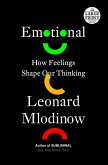Short description/annotation
This provides an overview of the current status of emotion theory.
Main description
Emotions are central to human behavior and experience. Yet scientific theory and research ignored emotions during most of the 20th century. This situation changed dramatically during the last 30 years of that century, which witnessed an upsurge of interest in emotions in a number of disciplines. This book arises from the 24 keynote papers presented at a symposium held in June 2001 that had the same title as this volume. The aim of that meeting was to review the current state of the art of research on emotions from a multidisciplinary perspective. Each chapter is authored by an acknowledged authority in the field. Together they provide an overview of what is currently being studied and thought about emotions, in disciplines ranging from neurophysiology and experimental psychology to sociology and philosophy.
Table of contents:
1. Introduction Anthony S. R. Manstead, Nico H. Frijda and A. H. Fischer; Part I. The Nature of Feelings and Emotions: 2. On the passivity of the passions Robert C. Solomon; 3. Emotions and rationality Jon Elster; 4. Emotions and feelings: a neurobiological perspective Antonio R. Damasio; 5. The concept of an evolved fear Arne Ohman and Stefan Wiens; 6. Deconstructing emotions for the sake of comparative research Richard A. Shweder; 7. From the emotions of conversation to the passions of fiction Keith Oatley; Part II. Basic Psychological Processes in Feelings and Emotions: 8. What we become emotional about Paul Eckman; 9. Feelings integrate the central representation of appraisal-driven response organization in emotion Klaus R. Scherer; 10. Emotions and action Nico H. Frijda; 11. Basic affects and the instinctual emotion system of the brain: the primordial sources of sadness, joy and seeking Jaak Panksepp; 12. Exposure effects: an unmediated phenomenon Robert B. Zajonc; 13. Feeling states in emotion: functional imaging device Joel S. Winston and Raymond J. Dolan; Part III. Feelings and Emotions: The Place of Pleasure: 14. The affect system: what lurks below the surface of feelings(?)33; John Cacioppo, Kyle Smith and Jeff Larsen; 15. Unfelt affect and irrational desire: springing from the brain Kent C. Berridge; 16. Some perspective on positive feelings and emotions: positive affect facilitates thinking and problem solving Alice M. Isen; 17. Pleasure, utility and choice Barbara A. Mellers; Part IV. Feelings and Emotions in Their Sociocultural Context: 18. The development of individual differences in understanding emotion and mind: antecedents and sequelae Judy Dunn; 19. Emotional intelligence: what do we know(?)33; Peter Salovey, Marja Kokkonen, Paulo Lopes and John D. Mayer; 20. Culture and emotion; models of agency as sources of cultural variation in emotion Batja Mesquita and Rose Hazel; 21. Emotions norms, emotion work and social order Peggy A. Thoits; Part V. Feelings, Emotions, and Morality: 22. On the possibility of animal empathy Frans B. M. de Waal; 23. Emotional gifts and 'you first' micropolitics; niceness in the socioemotional economy Candace Clark; 24. Introducing moral emotions into models of rational choice Robert H. Frank; 25. Virtue and emotional demeanor Nancy Sherman; Epilogue: 26. Feelings and emotions:where do we stand(?)33; Nico H. Frijda, Anthony S. R. Manstead and A. H. Fischer.
This provides an overview of the current status of emotion theory.
Main description
Emotions are central to human behavior and experience. Yet scientific theory and research ignored emotions during most of the 20th century. This situation changed dramatically during the last 30 years of that century, which witnessed an upsurge of interest in emotions in a number of disciplines. This book arises from the 24 keynote papers presented at a symposium held in June 2001 that had the same title as this volume. The aim of that meeting was to review the current state of the art of research on emotions from a multidisciplinary perspective. Each chapter is authored by an acknowledged authority in the field. Together they provide an overview of what is currently being studied and thought about emotions, in disciplines ranging from neurophysiology and experimental psychology to sociology and philosophy.
Table of contents:
1. Introduction Anthony S. R. Manstead, Nico H. Frijda and A. H. Fischer; Part I. The Nature of Feelings and Emotions: 2. On the passivity of the passions Robert C. Solomon; 3. Emotions and rationality Jon Elster; 4. Emotions and feelings: a neurobiological perspective Antonio R. Damasio; 5. The concept of an evolved fear Arne Ohman and Stefan Wiens; 6. Deconstructing emotions for the sake of comparative research Richard A. Shweder; 7. From the emotions of conversation to the passions of fiction Keith Oatley; Part II. Basic Psychological Processes in Feelings and Emotions: 8. What we become emotional about Paul Eckman; 9. Feelings integrate the central representation of appraisal-driven response organization in emotion Klaus R. Scherer; 10. Emotions and action Nico H. Frijda; 11. Basic affects and the instinctual emotion system of the brain: the primordial sources of sadness, joy and seeking Jaak Panksepp; 12. Exposure effects: an unmediated phenomenon Robert B. Zajonc; 13. Feeling states in emotion: functional imaging device Joel S. Winston and Raymond J. Dolan; Part III. Feelings and Emotions: The Place of Pleasure: 14. The affect system: what lurks below the surface of feelings(?)33; John Cacioppo, Kyle Smith and Jeff Larsen; 15. Unfelt affect and irrational desire: springing from the brain Kent C. Berridge; 16. Some perspective on positive feelings and emotions: positive affect facilitates thinking and problem solving Alice M. Isen; 17. Pleasure, utility and choice Barbara A. Mellers; Part IV. Feelings and Emotions in Their Sociocultural Context: 18. The development of individual differences in understanding emotion and mind: antecedents and sequelae Judy Dunn; 19. Emotional intelligence: what do we know(?)33; Peter Salovey, Marja Kokkonen, Paulo Lopes and John D. Mayer; 20. Culture and emotion; models of agency as sources of cultural variation in emotion Batja Mesquita and Rose Hazel; 21. Emotions norms, emotion work and social order Peggy A. Thoits; Part V. Feelings, Emotions, and Morality: 22. On the possibility of animal empathy Frans B. M. de Waal; 23. Emotional gifts and 'you first' micropolitics; niceness in the socioemotional economy Candace Clark; 24. Introducing moral emotions into models of rational choice Robert H. Frank; 25. Virtue and emotional demeanor Nancy Sherman; Epilogue: 26. Feelings and emotions:where do we stand(?)33; Nico H. Frijda, Anthony S. R. Manstead and A. H. Fischer.








